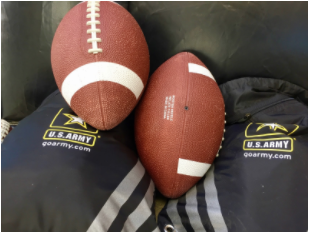Correction: The motto “semper paratus,” originally stated as the Army’s motto, is actually the motto for the U.S. Coast Guard.
Joining the army gave Jofferlyn Perpose the opportunity to receive a better education,funding her learning as she challenged herself to redefine her limits. It took her through boot camp, some of the toughest weeks in her life, where she came out stronger, becoming Sergeant Jofferlyn Perpose.
Joining the army gave Matthew Hart options, provided him education, and taught him perseverance. He learned to look danger straight in the eyes alongside his brothers, as he calls them. After going to war in Iraq, his comrades weren’t just good friends. They were family. He became Sergeant Matthew Hart.
Hart and Perpose, who now work with Army recruitment, came to MVHS on October 23 to talk to students about the possibility of an alternative type of education: the military. They hope to give out more information about military academies and attract those who are interested in military college.

A group of students crowded around their black and yellow clothed table at lunch, their attention focused on Hart, who wore a crisp white military uniform, and Perpose, in her green army fatigues. The handout contained information about military life. For some MVHS students, the path to college may be different than going directly to a four-year university. Therefore, Hart and Perpose shared their experiences to help these students better understand what joining a branch of the military means.
Perpose’s interest in joining the military began her junior year of high school. She began to seriously explore the options during her senior year, enlisting after graduation. As a former mechanic, she used these skills when she joined to earn a heavy equipment mechanic certification from the Army. But beyond the certifications she’s earned, which also include one allowing her to handle hazardous materials, what she’s taken away most from her experience in the military are lessons from experiences.

In addition to takeaways, Perpose also remembers challenges vividly, such as when she went to boot camp for training. Being alone and away from her family at 18, and going through rigorous training helped her grow as and individual.
“[I’ve] definitely become a better person, because I learned to be more independent,” Perpose said. “And I learned to be responsible and learned to see the world differently.”
The advantage of not worrying about the financial issue that accompanies college attracted students like junior Kaitlyn Zhou, who was interested in by the free tuition as well as the challenges a military college would bring, namely at the United States Military Academy West Point college.
Perpose’s college education is currently being paid for by the Army, allowing her the freedom to continue her education in mechanics without the worry of financial barriers. With opportunities like the reserve program, where members only work one Saturday and one Sunday every month along with two weeks in the summer while attending school on the Army’s bill, education can become more accessible.
“Everyone can join as long as they’re qualified, can take the challenge if they want to, or those who [haves a financial difficulty], because we have a good education program,” Perpose said.
“I think [military schools are] definitely not very popular because it’s really challenging and many students join because they don’t have to financial needs to get into a college,” Zhou said. “But over here, that’s not really an issue.”
In addition, Zhou explains her choice of a future dream college. Military college caught Zhou’s eyes because it is a motivation to overcome challenges and inspires herself to become a stronger person.
“I really want to challenge myself,” Zhou said., “And I know West Point is very different from most colleges because it is physically and mentally challenging.”
For Zhou, it’s the challenges that draw her to a military college, but for others, it runs in their family. Sophomore Elvis Lang discusses his ties with the West Point military academy.
“My uncle is the first one in the family to go to Army West Point about 30, 40 years ago,” Lang said. “And then recently last year, one of my oldest cousins got into West Point because of my uncle. It’s like following a family legacy.”
According to Lang, being able to serve in the military brought both excitement and worry to the family. In addition, Lang believes that being able to enroll into a military college is beneficial to the student.
“I think it’s a really good idea [to enroll into West Point] if you’re willing to put the work in because you get a lot of benefit,” Lang said. “For a lot of people, you get college loans that you have to pay back, but with West Point, you don’t have to do any of that and West Point is also a very good place where you can choose where you want to go in your life.”
Hart, an experienced officer, can attest to both the challenges and the payoffs of a life in the military. The military taught him, among other things, to never give up, and to be “always ready,” like the Coast Guard’s motto, semper paratus.
“I turned into [someone who] is not a quitter. I learned that life is extremely precious — there’s no point in wasting your time doing something you don’t love,” Hart said. “I think the biggest [thing] I’ve learned is how blessed we are to be Americans.”
Hart was sent to Irag in 2008, where he was stationed in Kuwait as a tank gunman. His travels opened him up to new experiences and new emotions as well.

“It’s frightening,” Hart said. “I was nervous. I was very scared. I was very hesitant. Of course, everyone goes through the doubts.”
While the fear of being in combat never went away completely, Hart cites those who were with him on his tour as a constant source of strength.
“Everywhere I went, I was never by myself. I was with friends and they become my brothers who I still talk to this day,” Hart said. “Everything I did was with someone and it really helps you get used to things when you’re not the only guy scared.”
According to Hart, it was the constant feeling of camaraderie that got him through difficult times, which kept him fighting for his country. His brothers in arms were a constant source of strength. Often, a blatant openness accompanied this.
“Let me tell you the difference between a military friend and a best friend,” Hart said. “A civilian friend you can tell your deepest darkest secret, but probably in a fight, they probably will not take your back. A military friend, they get your back, they’ll go down with you, they’ll go to jail with you. But if you tell your deepest, darkest secret, they will tell everybody. They will use it against you as jokes.”
While this feeling of fellowship and brotherhood has taken Hart far, he encourages those interested in joining the service to really do their research before they commit. There are many resources to find information about the military and if it’s the right fit for a person, something that he keeps in mind as a recruitment officer.
“We want to see if this is right for you,” Hart said. “There’s some people we talked to that this is not a good path for them and there’s some people that just don’t know what they are signing up for. Or people think that all we do is go to war and shoot guns, which is not the case at all either. If anybody is interested in this, just educate yourself. Talk to the military members, talk to the recruits.”










